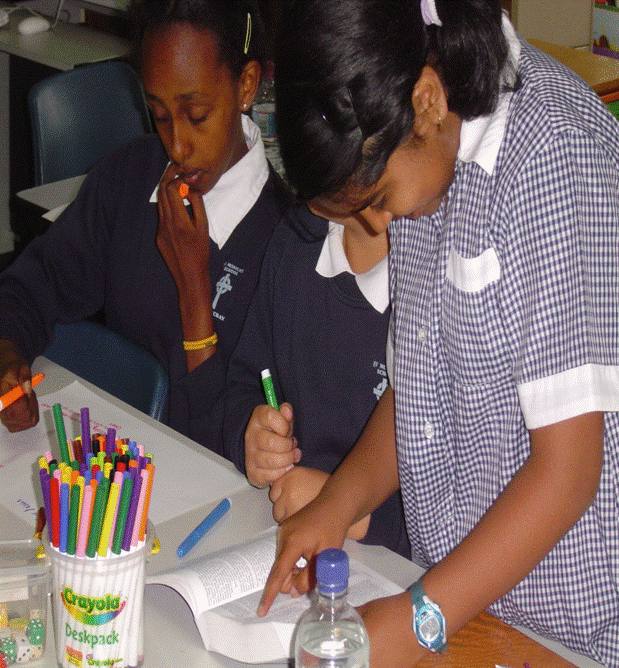Min Kim's Website
My Educational Philosophy
As a primary teacher, I dedicate my life to help students realise their talents and abilities, to ensure that they live their lives to the full. To do so, I believe that it is crucial for me to particularly focus on the following aspects in my teaching:
· Communicating the Importance of Positive Belief in one’s ability to learn
· Integrative Approach
· Cooperative Group Activity
Firstly, it is crucial for teachers have positive believe in their students’ ability to learn, because having this belief can have a significant impact on students’ actual performance.
A self-fulfilling prophesy refers to a groundless expectation that leads to behaviours that then make the original expectation come true (Merton, 1948). Numerous studies that addressed this notion have been done to specifically examine how teacher’s expectation on students’ performance, has impact on their actual performance (Good & Brophy, 2003). The studies have found that what and how teachers teach their students significantly varied, depending on the type of expectation that they hold of their students, which then worked towards producing the similar outcomes that they expected to see in them. For instance, Good and Brophy (2003) found that the students who were expected to achieve, tended to be asked more questions, given more chances and a longer time to respond, than students who were expected to do poorly. The high-achieving students were also found to be provided with more informative and constructive feedback on their performance (Good & Brophy, 2003).
Secondly, I perceive that taking an integrative approach in teaching is crucial to enrich students’ learning experiences. This is because it helps them to create connections among the contents within the same subject area, as well as across the whole curriculum. Numerous research revealed that many workers often fail to use the knowledge that they learnt in school, to help them in their work and home environments, so this restrict the effectiveness of their lives (Zevenbergen, Doyle, & Wright, 2005). This is mainly due to the fact that most people had been taught in a traditional way, where their education was heavily characterized by the fragmentation of concepts and topics.
However, unlike the traditional method of teaching, the integrated style promotes education that cuts across subject-matter lines, by brining together various curriculum into meaningful association to focus upon broad areas of study (i.e., theme-based approach) (Humphrey, Post and Ellis, 1989). For example, the teacher may decide to use ‘Energy’ as her overall teaching focus for a few weeks, whereby s/he combines several school subjects (e.g., Science, SOSE, Arts, English, Maths) under that theme. This way of teaching promotes learning that closely resembles how students encounter subjects in the real world: Numerous concepts from various disciplines are combined in one activity. Hence, they come to see that what they learn in school can and do have relevance in their every-day life, which would in turn act as preparing them for life-long learning.
Lastly, I place strong importance on getting students to work cooperatively in groups (Booker, Bond, Sparro, & Swan, 2004). This is one of the teaching strategies, where students of different levels of group, work on various learning activities to build/enhance their understanding of a subject. This form of learning requires each member of a team to not only be responsible for their own learning of what was taught, but also for helping the teammates learn as well (Johnson & Johnson, 1990).
One of the major benefits of this style of learning is that it promotes logical reasoning. As students are encouraged to reason about various possible ways in which they think can use to solve the task given to them. The whole processes of making sense of their own and their group members’ methods and explaining what they see or hear from each other, all contribute towards achieving the overall aim of enriching their learning experience.
Furthermore, this teaching approach can especially work towards benefiting students, with English as Second Language. Particularly in Maths, many overseas students often understand the main concepts involved in Maths, and thus can solve the problems given to them. However, they cannot verbalise the processes involved in doing so, due to their limited knowledge in English. Therefore, by providing them with opportunities to practise their English communication skills in a small group setting, which is less threatening than having to do it to the whole class, those students would find it much easier to gain the skills and the confidence in their oral communication.
Another major advantage of working in group settings, is that it promotes social development in students of all abilities. Since they are all required to work towards the same common goal, they establish the sense of community. Also in this process of working in a group, they also come to respect and value each other’s differing talents and abilities.
I believe that taking those three main principals into account, when planning and conducting lessons, would definitely help me to be more effective in my teaching.
References
Booker, G., Bond, D., Sparron, L., & Swan, P. (2004). Teaching Primary Mathematics. NSW: Pearson.
Good, T. & Brophy, J. (2003). Looking in classrooms (9ths ed.). Boston: Allyn and Bacon.
Swan, M. (2005). Standards Unit- Involving learning in mathematics: challenges and strategies. UK: Success for All.
Vingerhoets, R., & Winters, B. (2000). Green Maths Level 4. VIC: Gould League
Zevenbergen, R., Doyle, S., Wright, R. (2005). Teaching Mathematics in Primary Schools. Allen & Unwin.
Humphreys, A., Post, R., & Ellis, A. (1981). Interdisciplinary Methods: A Thematic Approach.. CA: Goodyear Publishing Company.

Let Every Child Be a Winner!

As a teacher, I aim to help students to confidently believe in their ability to succeed, by letting them know the true meaning of success: ’Success is when you have achieved your own personal best, not someone else’s.

Co-operative work is an essential
element to faciliate students' learning